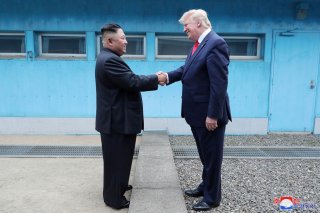Why North Korea and America's Theater of Gesture Politics Is Now at and End
Real negotiations are needed, not leader-to-leader photo-ops.
Editor's Note: We asked this author the following question - What direction do you see U.S.-North Korea relations heading in for the rest of the year?
In U.S.-North Korea relations, current situation with the coronavirus has become a game changer. Reckoning President Trump loses his domestic support due to his poor management of the current situation in the U.S., his card to create a diversion from domestic to international affairs has moved from North Korea to China. The effect of gesture politics between Trump and North Korea’s Leader Kim Jong-Un with photo ops for last two years was just limited to U.S. elections, and due to coronavirus outbreak, the Trump now has better card than North Korea.
From Kim’s side, the two-year experiment with Trump is coming to an end, and now Kim is certain that U.S. will not change their maximum pressure policy even though Kim made his own nice gestures. Kim has also learned that his relationship with Trump is from a personality-to-personality of leaders, not based on the traditional government-to-government negotiations framework.
The 2019 Hanoi meeting ended up with a failure as it was done in none-standard way—there was not sufficient preparation from the working group meetings prior to the Summit. Trump-Kim’s third meeting at the Demilitarised Zone (DMZ) in Korea was all about political theatre. No global leaders have made such a decision on impulse without preparing security protections and traditional diplomatic protocols. Rather, it was more like a Trump reality TV show.
In hindsight, Kim’s unpresented “Christmas Gift” for Trump in 2019 could be an unspoken message from him to declare the end of gesture politics and the beginning of the new normal in US-North Korea relations.
In the rest of 2020, will for example, Kim Jong-un test an ICBM? A nuclear weapon?
From the beginning of his power succession in 2011, Kim made it clear that he had two main aims: military and economic development. For him, becoming a nuclear state is a regime survival strategy. Arguably, it is unlikely for North Korea to test an ICBM in near future as its intention is not to provoke, but to sustain the regime. Kim has learned that Trump does not have authority to ease the sanctions, but it can only be done by the collective actions from the UN Security Council. However, he is also well aware that China will not help fully lift sanctions. If Beijing act, it will only help remove them partially. After all, China has benefited from the sanctions in North Korea as the only available trade market for North Korea.
In the new normal framework, Pyongyang will continue its own way of maintaining its nuclear facilities—North Korea cannot be denuclearised because it already has the technology and knowledge for nuclear weapons. On top of that, Kim has the lessons learned from what happened to Hussein and Gaddafi when they made deals with the West or gave up their WMD programs.
Will Kim wait to see if Trump gets re-elected? How will Trump seek to engage Kim—or not?
The United States cannot afford to be outside of the Korea Peninsula. This is not because of North Korea, but because of China. A good example is the existence of the anti-missile THAAD battery in South Korea, which Washington really aims at China not North Korea. In the new normal situation, the U.S. will resume playing the China-threat card, unless there are major unexpected events occurring in North Korea or Trump wants to maintain the image of his reality TV show.
Another variable to think about is South Korea’s President Moon Jae-in who facilitated and enabled the environment of engagement. Kim will remain in charge until his death, but Trump and Moon are term-limited. Even if Trump is re-elected, if the next president in South Korea is not supportive, Trump will not be able to achieve the same level of engagement from Kim if he wants to continue relations with North Korea. Therefore, a long-term U.S.-North Korea engagement will require moving beyond Trump and Kim’s personality-to-personality framework.
Dr. Sojin Lim is a Senior Lecture (Associate Professor) in MA North Korean Studies at the University of Central Lancashire, UK. She is Co-Director of the International Institute of Korean Studies, and also works as a Co-Editor of Routledge Research on Korea Series.
Image: Reuters

